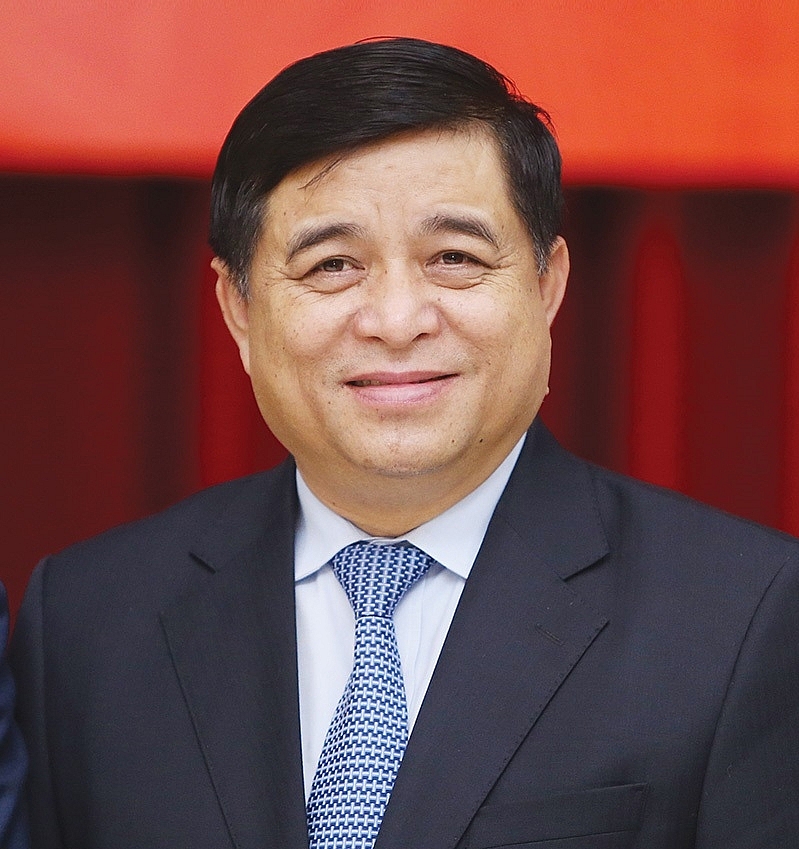Putting innovation at forefront of progress
 |
| Minister of Planning and Investment Nguyen Chi Dung |
Vietnam has just accomplished the 5-year Socioeconomic Development Plan for the 2016-2020 period, as well as overcome the past 12 months with a lot of difficulties due to trade tensions among big economies, the depression of the world economy, and fighting against the pandemic and natural disasters.
However, 2020 can still be considered much more successful than 2019 in Vietnam, and even the most successful out of the five years of the mid-term plan, as numerous achievements were attained.
In 2021 there will continue to be challenges worldwide and locally. COVID-19 has yet to be controlled in many places, and no vaccine can completely eradicate the coronavirus. Trade wars could still intensify. And numerous countries are facing budget deficits and high public debt, which can contain a lot of risks related to financial crisis.
The position and power of our country has improved much, but we are still facing the middle-income trap, while competitiveness is not very high, especially in some key areas for future development. Some social troubles will impact development, such as population ageing, the rich-poor and development-level gap, exploitation and use of natural resources, and climate change.
Fresh mindset
However, we can still grasp onto strong prospects even in difficult times. Over a dozen new-generation free trade agreements have been signed and taken effect, Industry 4.0 is evolving, trade and investment are relocating, and Vietnam’s golden population period will remain for the next 10 years. This is a chance for Vietnam to upsurge thanks to the restructuring of global supply chains and the adjustment of the world order.
So if we want to go fast, we must choose the right way. This is a good moment for Vietnam to restructure the economy, embrace digital transformation, and change development models towards fast, sustainable, and inclusive growth. We will not stand beside, or behind, others one more time to watch new trends or new opportunities pass us by.
In order to maximise this potential, we have to create a new mindset, and a new way of doing things in all areas. For example, we are changing the mindset of management authorities to strengthen most business and investment activities and exercises. Besides this, we are restructuring the economy based on science, technology, and innovation to enhance productivity, quality, performance, autonomy, and competitiveness.
The legal framework for new business models and the digital economy is being perfected. Policies for piloting new services, new technologies, new business models like the sharing economy or night-time economy, innovation projects, and startups are being composed, as well as calling for some ventures to support in these regards.
Small- and medium-sized enterprises in Vietnam are being supported to carry out digital transformation, improve their competitiveness, and work with foreign-invested counterparts or join global supply chains.
Meanwhile, foreign-invested projects which apply high technologies, which are environmentally friendly, and which closely cooperate with and transfer technologies to local suppliers will be welcome, while those causing environmental pollution, engaging in transfer pricing, and using a lot of natural resources and outdated technologies will be denied.
The government has confirmed the determination of building digital infrastructure, smart connections, and synchronising data infrastructure of the country for the process of digital transformation. With that, the National Strategy on the Fourth Industrial Revolution by 2030 is to be issued to fulfil the goals set in the Politburo’s Resolution No.52-NQ/TW released last September on a number of policies on the nation’s proactive involvement in the Fourth Industrial Revolution.
Accordingly, Vietnam is accelerating the development of infrastructure, databases, and human resources; building an e-government towards a digital government; enhancing national innovative capacity; and developing a number of priority technologies for active engagement in Industry 4.0 such as robotics, advanced materials, renewable energy, AI, the Internet of Things, big data, and blockchain.
The country will also expand international cooperation and integration in science and technology, particularly priority technologies. Vietnam is stepping up the development of high-speed internet services and secured digital infrastructure to meet the demand for big data connection and processing, the application of digital technology in the government, and delivery of public services in all areas as well as building a real-time information system to support the government’s governance and administration.
By 2030, the digital economy will contribute around 30 per cent of the country’s GDP, and productivity will expand 7.5 per cent annually on average. There will be universal access to fibre-optic internet and 5G, the completion of digital government development, and establishment of smart cities in key economic zones across all regions, which will be connected with a regional and global network of smart cities.
The establishment and construction of the National Innovation Centre, along with the Vietnam International Expo (which is expected to become an annual event) and the evolvement of the Vietnam Innovation Network with the cooperation of many countries, is also expected to contribute to boost the digital transformation of the country, enabling it to catch up with trends and seize opportunities for outstanding growth in the new era.
 |
| Putting innovation at forefront of progress |
A prosperous Vietnam
On the other hand, in order to realise a prosperous Vietnam, there needs to be a robust plan of developing the country as a world or regional financial centre. This will be the new driving force for further economic growth, wooing more international revenues and capital, and putting the country onto the global financial map.
Ho Chi Minh City has already provided financial services to neighbouring nations such as Laos, Cambodia, Myanmar, and Brunei, and is expected to reach the whole Asian market and beyond. Meanwhile, the central city of Danang has issued a plan to carry out the National Financial Inclusion Strategy until 2025 with a vision towards 2030.
Vietnam boasts favourable conditions, from geographical to population advantages, to become a leading jurisdiction for an international financial market. From Ho Chi Minh City, it takes only three hours by air to reach all of ASEAN and Northeast Asia. Vietnam also sits in a time zone that is different from 21 other international financial centres.
That is a very narrow doorway that presents a prime advantage.
So as to realise the dream of developing into a financial hub, plans should be put into the country’s Socioeconomic Development Strategy for the 2021-2030 period, with a vision towards 2045. The country also needs to ensure a better investment and business climate, attract and develop high-quality financial human resources, build world-class infrastructure, and develop a stronger brand and reputation.
Developing an international financial centre, which is expected to contribute billions of US dollars to the country and digitalising the economy, can push Vietnam’s economy to grow in a faster and more sustainable manner, and will be the major driving force for the nation to become a prosperous country, step by step.
What the stars mean:
★ Poor ★ ★ Promising ★★★ Good ★★★★ Very good ★★★★★ Exceptional
Themes: Digital Transformation
- PM sets five key tasks to accelerate sci-tech development
- Ho Chi Minh City launches plan for innovation and digital transformation
- Dassault Systèmes and Nvidia to build platform powering virtual twins
- Sci-tech sector sees January revenue growth of 23 per cent
- Advanced semiconductor testing and packaging plant to become operational in 2027
Related Contents
Latest News
More News
- VinaCapital launches Vietnam's first two strategic-beta ETFs (February 26, 2026 | 09:00)
- PM sets five key tasks to accelerate sci-tech development (February 26, 2026 | 08:00)
- PM outlines new tasks for healthcare sector (February 25, 2026 | 16:00)
- Citi report finds global trade transformed by tariffs and AI (February 25, 2026 | 10:49)
- Vietnam sets ambitious dairy growth targets (February 24, 2026 | 18:00)
- Vietnam, New Zealand seek level-up in ties (February 19, 2026 | 18:06)
- Untapped potential in relations with Indonesia (February 19, 2026 | 17:56)
- German strengths match Vietnamese aspirations (February 19, 2026 | 17:40)
- Vietnam’s pivotal year for advancing sustainability (February 19, 2026 | 08:44)
- Strengthening the core role of industry and trade (February 19, 2026 | 08:35)

 Tag:
Tag:



















 Mobile Version
Mobile Version